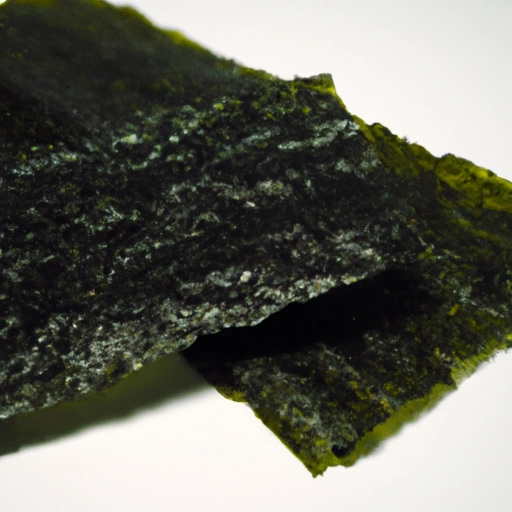Nori
Description

Nori is a type of edible seaweed that is widely used in Japanese cuisine and has gained popularity across the globe. It is most commonly recognized as the green wrapping around sushi rolls. Nori comes in thin, dried sheets and has a unique, savory umami flavor. Its versatility allows it to be used in a multitude of dishes, ranging from traditional Asian preparations to innovative Western cuisine.
Common uses
Nori is commonly used as a wrapping for sushi rolls, as a garnish for noodle dishes, and as a seasoning in the form of flakes or powder. It can also be enjoyed as a snack, in the form of seasoned and roasted nori sheets, known as 'nori snacks.'
Nutritional value
Calories
Per typical serving of 2.5 grams (approximately one sheet): roughly 5 to 10 calories.
Protein
Contains about 1 to 2 grams of protein per sheet.
Fat
Minimal fat content, generally less than 0.1 grams per sheet.
Carbohydrates
Approximately 0.5 grams of carbohydrates per sheet.
Vitamins
Rich in vitamins A, C, E, and K, as well as various B vitamins including B12.
Minerals
Contains a range of minerals such as iodine, magnesium, phosphorus, potassium, and selenium.
Health benefits
Nori is known for its high content of vitamins, minerals, and antioxidants. It's particularly noted for its iodine content, which is essential for thyroid health. The vitamins and minerals found in nori support immune health, bone health, and provide anti-inflammatory benefits.
Potential risks
Excessive consumption of nori may lead to an iodine overload, which can negatively affect thyroid function. Individuals with seafood allergies should also exercise caution when consuming nori. As it can absorb heavy metals from the water it grows in, it's important to source nori from clean, non-polluted waters.
Common recipes
Nori is featured in sushi rolls, onigiri (rice balls), and soups such as miso soup. It's also used in various snacks and rice dishes.
Cooking methods
Nori can be toasted, crumbled, or used as is. It does not require extensive cooking and is often added as a final touch to dishes to preserve its flavor and texture.
Pairing with other ingredients
Nori pairs well with rice, seafood, vegetables, and soy sauce-based condiments. It complements the flavors of sesame seeds, wasabi, and pickled ginger.
Summary
Nori is a versatile and nutritious seaweed that has made the leap from being a staple in Japanese cuisine to becoming a beloved ingredient worldwide. Its historical significance and evolution into a culinary mainstay reflect its undeniable appeal. With its rich nutritional profile and array of health benefits, nori is not just a delicious ingredient but also a healthy addition to various dishes, making it a valuable component in both traditional and modern recipes.